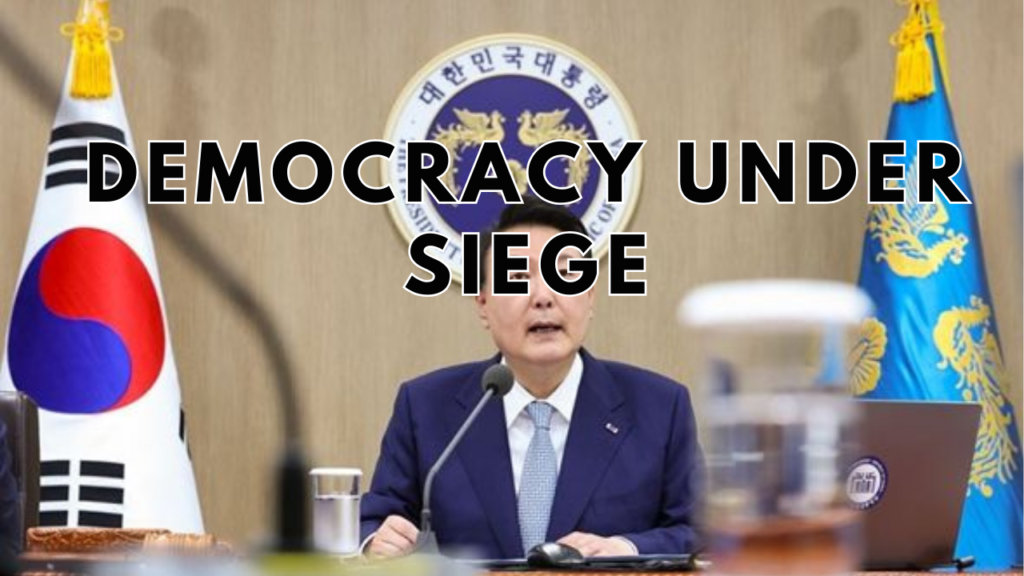Sudden Power Move Shocks Nation
South Korea faced an unprecedented crisis when President Yoon Suk Yeol declared martial law late Tuesday night. The South Korea martial law crisis sent shockwaves through the nation’s political landscape. The dramatic move came without warning through a televised address, catching both citizens and lawmakers off guard.
President Yoon claimed the measure was necessary to protect against anti-state forces and alleged North Korean sympathizers. His declaration sparked immediate controversy and resistance from across the political spectrum. The president’s approval ratings had already been struggling before this dramatic decision.
The military deployment began within hours of the announcement. Armed forces took positions around key government buildings and major intersections throughout Seoul. This show of force reminded many older citizens of the country’s authoritarian past.
Parliament’s Swift Response
The South Korea martial law crisis triggered immediate resistance from lawmakers across party lines. Both opposition and ruling party members demonstrated remarkable unity in their response. In a historic 190-0 vote, they struck down the presidential order, showing unprecedented bipartisan cooperation.
Military forces surrounded the parliament building during the crisis, creating tense standoffs with elected officials. Some lawmakers had to resort to climbing walls to enter the building, displaying remarkable determination. They used fire extinguishers to prevent soldiers from entering the main hall, protecting democratic institutions.
The Democratic Party, which holds 170 seats in the 300-member parliament, led the charge against the declaration. Even members of Yoon’s own People Power Party joined the opposition, demonstrating that democratic principles transcended party lines.
International Reactions and Market Impact
The sudden martial law declaration rattled international observers and global markets. The White House expressed deep concern before showing relief after Yoon lifted the order. South Korean stocks tumbled sharply, and the won weakened significantly against the dollar.
Local markets experienced unprecedented volatility during the six-hour crisis. Citizens rushed to stock up on essential goods, creating temporary shortages in some areas. Many companies implemented emergency protocols, urging employees to work from home.
International investors closely monitored the situation, with some temporarily suspending trading in Korean markets. The crisis highlighted the delicate balance between political stability and economic confidence in modern democracies.
Economic Consequences
The brief period of martial law had immediate economic repercussions. The Korean Stock Exchange saw its steepest single-day decline in recent history. Major Korean companies faced significant value losses as investor confidence wavered.
Small businesses particularly felt the impact as customers stayed home during the crisis. The uncertainty led to temporary closures of many shops and restaurants. The tourism sector also suffered as international travelers canceled or postponed their visits.
Democratic Resilience
The swift resolution of the crisis demonstrated the strength of South Korea’s democratic institutions. Civil society organizations mobilized quickly to protect democratic values. Social media platforms became crucial tools for organizing peaceful resistance.
Young people, in particular, showed strong opposition to any return to authoritarian rule. University students organized peaceful demonstrations across major cities. The crisis united different generations in defense of democracy.
Final Thoughts: Democracy Prevails in South Korea’s Political Drama
The South Korea martial law crisis ended as quickly as it began, leaving lasting lessons about democratic resilience. President Yoon’s dramatic move may have lasting consequences for his political future and the country’s democratic institutions. The crisis showed how far South Korea has come from its authoritarian past.
The unprecedented unity among lawmakers and citizens in defending democracy deserves recognition. This event will likely influence future political discourse and democratic safeguards in South Korea. What are your thoughts on this unprecedented event in South Korean democracy? Share your views in the comments below.







